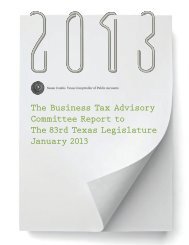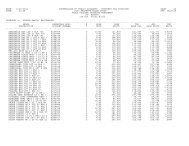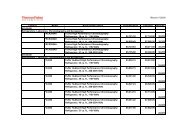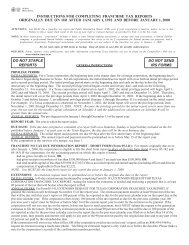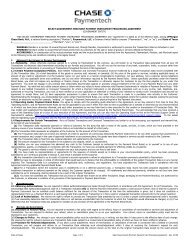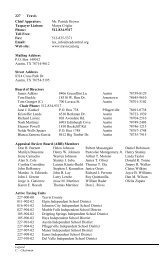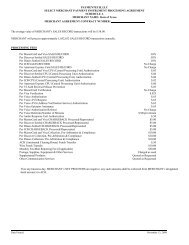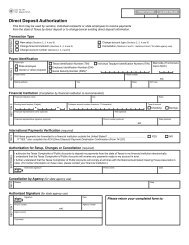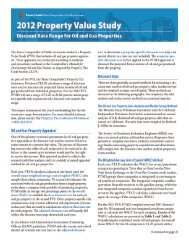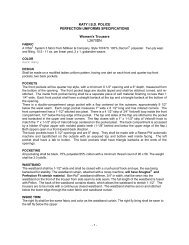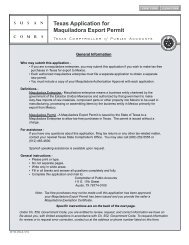Contracts Management Guide - Texas Comptroller of Public Accounts
Contracts Management Guide - Texas Comptroller of Public Accounts
Contracts Management Guide - Texas Comptroller of Public Accounts
Create successful ePaper yourself
Turn your PDF publications into a flip-book with our unique Google optimized e-Paper software.
Drilling Co. v. Post, 662 F2d 1190, 1195 (5 th Cir. 1981. Acceptance <strong>of</strong> performance alone does not constitute substantial performance,<br />
although it is a factor to be considered in determining whether there was substantial performance. Measday v. Kwik Kopy Corp., 713<br />
F.2d 118, 124-25 (5 th Cir. 1983).<br />
Condition Precedent. A contract may include conditions precedent that must be satisfied before a vendor has an obligation <strong>of</strong><br />
performance. A condition precedent may be either a condition to the formation <strong>of</strong> the contract or to an obligation to perform an<br />
existing agreement. Hohenberg Bros. Co. v. George E. Gibbons & Co., 537 S.W.2d 1, 3 (Tex. 1976). To make performance conditional,<br />
terms such as “if”, “provided that”, “on condition that”, or some similar phrase <strong>of</strong> conditional language must normally be included,<br />
although there is no requirement to utilize such language. Criswell v. European Crossroads Shopping Ctr., Ltd., 792 S.W.2d 945, 945<br />
(Tex. 1990).<br />
Promissory Estoppel. The doctrine <strong>of</strong> promissory estoppel is derived from § 90 <strong>of</strong> the Restatement <strong>of</strong> <strong>Contracts</strong>, which states: A<br />
promise which the promisor should reasonably expect to induce action or forbearance <strong>of</strong> a definite and substantial character on the part<br />
<strong>of</strong> the promise and which does not induce such action or forbearance is binding if injustice can be avoided only be enforcement <strong>of</strong> the<br />
promise. Restatement (Second) <strong>of</strong> <strong>Contracts</strong> § 90 (1971); Aubrey v. Workman, 384 S.W.2d 389, 393 (Tex. Civ. App. – Fort Worth<br />
1964), writ ref’d n.r.e.). Promissory estoppel does not operate to create liability where it does not otherwise exist. Hruska v. First State<br />
Bank <strong>of</strong> Danville, 747 S.W. 2d 783, 785 (Tex. 1988). Promissory estoppel does not create a contract where none existed before, but only<br />
prevents a party from insisting upon his strict legal rights when it would be unjust to allow him to enforce them. “Moore” Burger, Inc. v.<br />
Phillips Petroleum Co., 492 S.W.2d 934, 937 (Tex. 1972).<br />
The requisites <strong>of</strong> promissory estoppel in <strong>Texas</strong> are: (1) a promise; (2) foresee ability <strong>of</strong> reliance thereon by the promisor; and (3)<br />
substantial reliance by the promise to his detriment. English v. Fischer, 660 S.W.2d 521, 524, (Tex. 1983). When promissory estoppel is<br />
raised to bar the application <strong>of</strong> the statute <strong>of</strong> frauds, there is an additional requirement that the promisor promised to sign a written<br />
document complying with the statute <strong>of</strong> frauds. Nagle v. Nagle, 633 S.W.2d 796, 800 (Tex. 1982); “Moore” Burger, 492 S.W.2d at 936-37<br />
(Tex. 1972); Margin v. Norwest Mortgage, Inc. 919 S.W.2d 164, 167 (Tex. App. – Austin 1996, no writ); Coastal Corp. v. Atlantic<br />
Richfield Co., 852 S.W.2d 714, 718 (Tex. App. – Corpus Christi 1993, no writ); Cobb v. West Tex. Microwave Co., 700 S.W. 2d 615, 616<br />
(Tex. App. – Austin 1985, writ ref’d n.r.e.).<br />
Revocation <strong>of</strong> Acceptance (UCC). Under the UCC, a buyer may reject or revoke acceptance <strong>of</strong> non-conforming goods. Tex. Bus. &<br />
Com. Code Ann. §2.608 (Vernon 1994). Otherwise known as the “perfect tender” rule, a buyer may reject non-conforming goods in<br />
whole or in part. Tex. Bus. & Com. Code Ann. §2.608 (Vernon 1994). Rejection or revocation <strong>of</strong> acceptance will impose additional<br />
duties on a buyer.<br />
Anticipatory Breach. The term anticipatory breach is a term that is described as a basis to avoid performance. To prove that<br />
affirmative defense <strong>of</strong> anticipatory breach <strong>of</strong> a contract, the defendant must show either words or actions by the plaintiff that indicate an<br />
intention to not perform the contract according to its terms. Builders Sand, Inc. v. Torture, 678 S.W.2d 115, 120 (Tex. App. – Houston<br />
[14 th Dist.] 1984, no writ). The plaintiff must have distinctly, unequivocally, and absolutely refused to perform either the whole contract<br />
or a covenant which affects the whole consideration. American Bankers Inc. Co. v. Moore, 73 S.W.2d 620, 622 (Tex. Civ. App. – Fort<br />
Worth 1934, no writ). The refusal to perform must be unexcused. Taylor Pub. Co. V. Systems Mktg. Inc. 686 S.W.2d 213, 217 (Tex.<br />
App. – Dallas 1984, writ ref’d n.r.e.).<br />
lxxxi <strong>Texas</strong> Administrative Code §113.9<br />
lxxxii §2261.102. Liability Insurance Coverage Required. Each state agency shall, when feasible, include provisions in each <strong>of</strong> its contracts for<br />
goods or services that are subject to this chapter that require the contractor to carry director or <strong>of</strong>ficer liability insurance coverage in an<br />
amount not less than the value <strong>of</strong> the contract that is sufficient to protect the interests <strong>of</strong> the state in the event an actionable act or<br />
omission by a director or <strong>of</strong>ficer <strong>of</strong> the contractor damages the state’s interests.<br />
lxxxiii <strong>Texas</strong> Government Code §2261.101 Remedies and Sanctions Schedules. (a) Each state agency shall create and incorporate in each <strong>of</strong><br />
its contracts for goods or services that are subject to this chapter a remedies schedule, a graduated sanctions schedule, or both, for breach<br />
<strong>of</strong> the contract or substandard performance under the contact. (b)State agencies shall design fair and feasible standards that will hold<br />
contractors accountable for breach <strong>of</strong> contract or substandard performance under a contract without diminishing the number <strong>of</strong> able<br />
providers who are willing to contract with the state.<br />
lxxxiv <strong>Texas</strong> Government Code §2155.4441. Preference Under Service <strong>Contracts</strong>.<br />
lxxxv <strong>Texas</strong> Government Code §572.051. Standards <strong>of</strong> Conduct; <strong>Texas</strong> Government Code §2155.003. Conflict <strong>of</strong> Interest<br />
lxxxvi <strong>Texas</strong> Government Code §2252.901. <strong>Contracts</strong> with Former or Retired Agency Employees; <strong>Texas</strong> General Appropriations Act, Article<br />
IX, Section 9-6.27.<br />
lxxxvii Tex. Bus. Corp. Act §2.45<br />
152



